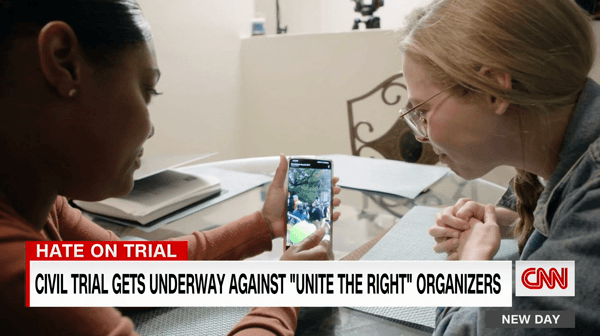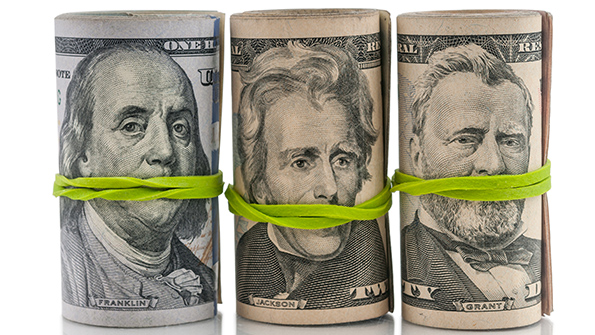An exclusive inside look with your free CNN account |
|
|
🎤 In the field with CNN's Elle Reeve By Kimberly Richardson |
As a kid, CNN correspondent Elle Reeve liked to watch the news for clues about the adult world. But she didn't really think of journalism as a job, at least for someone like her, until her family moved to Missouri. "The University of Missouri had a journalism school, so why not try that?" Reeve thought. Little did she know that years later viewers would describe the award-winning correspondent as remarkably brave for embedding herself into countless chaotic scenes. From covering all things alt-right to revealing Philadelphia's street fentanyl supply, we asked Reeve about the impact she's had on CNN's audience. The following is an edited version of our conversation. What is the most fascinating interview you've done at CNN, and why? Keith Scott, a man who'd never been to a political rally before the 2020 election but afterward spent months following the "Stop the Steal" caravan, a group promoted the lie that former President Donald Trump won the 2020 election. Scott said he joined the caravan after hearing about it on Alex Jones' show. He marched to the US Capitol on January 6, 2021. A year later, Scott was blunt about the movement he was a part of, calling it a cult. He said he wanted to warn others about the dangers of getting swept up in politics and letting it take over your life. And yet, in 2022, he still claimed the election was "stolen." He was still ambivalent about the January 6 riot — even though he described watching rioters beat a cop —saying he wanted to be fair to "both sides." It was a real lesson in human psychology, but in the moment, during the interview, it was hard to control my anger, because I'd been at January 6 and saw many of the exact same terrible things that he had, I thought those things were unequivocally bad, and he was making excuses for them. You've worked on a lot of tough stories, including America's addiction crisis. How do you gain the trust of the people affected to share their stories with CNN? There are a lot of subtle nonverbal cues people send to set our place in the social hierarchy, and I try to suppress those instincts as much as possible. I don't want anyone I interview to think that I think I'm better than them — that's access poison. I dress down and speak softly. I've learned it's OK to tell them a bit about myself, because then I don't seem like an unreal TV alien. | |
|
CNN's Elle Reeve revisits Charlottesville, Virginia, five years after the "Unite the Right" rally. |
Tell us what you're most proud of in your journalism career. The Unite the Right rally in Charlottesville in 2017 destroyed the alt-right wing of the white power movement, and the documentary I did about it played a big part in that. (The white power movement still exists, of course, but the alt-right was younger and based on the internet, and for a time, was the part of white power with the most people and energy.) Before the Charlottesville rally, the term alt-right was up for grabs — Steve Bannon was happy to be associated with it. But that documentary showed them plainly screaming anti-Semitic chants, and there was no denying who they were. It had huge social, financial and legal consequences. I'd never imagined that I'd do something that would have a real observable effect on the world. Gymnastics once pressured young athletes to stay skinny from a very young age, but a newer culture emphasizes power over weight. What's one thing you hope the audience gets from your analysis on the topic? Gymnastics is an incredibly athletic sport, but it's also an elaborate display of femininity — the sparkles, smiles, dancing and the demand that the gymnasts make the difficult look easy. It's a bit of a metaphor for womanhood. So I think when gymnastics culture changes, it means the broader culture's changed, too. And in this case, for the better. I love to report that rare bit of good news. Throughout your career you've uncovered violent subcultures. Explain why that's remained an important part of your job. My family lived in downtown Atlanta for the first half of my childhood, and rural Tennessee for the second. That meant I was a white kid in mostly black schools, and then I was a white kid in mostly white schools. They talked about history differently. They talked about racism differently. Small-town America was not as wholesome as the politicians were always saying on the news! Wanting people to understand that, and to see what I saw — that's basically my origin story. |
|
|
| "Understand what makes you special, and what knowledge you have that no one else does." |
- Elle Reeve, correspondent |
|
|
"Understand what makes you special, and what knowledge you have that no one else does." |
- Elle Reeve, correspondent |
|
|
What do your friends and family find the most surprising about your job? When I interview people with hateful beliefs, I'll get a lot of comments like, "I woulda punched that guy in the face." And I smile and laugh politely, but it's like, buddy, no you wouldn't. You would do no such thing! If you were in the middle of those dudes you would melt into a little puddle on the ground! A lot of the emotion in the room during a confrontational interview doesn't translate through the screen. People love that Mike Tyson line: "Everyone has a plan till they get punched in the mouth." OK, sure, that's true, but I'd offer a corollary: Everybody has a plan until they take their big swing and their opponent doesn't explode into dust. You say that one zinger you've been kicking around in your head, and then what? They're still sitting there, and they're probably not sobbing, "You're right, my whole life has been a fraud." And then you have to figure out what to do next. That's what people don't understand. You're constantly on the go, traveling from one big story to the next. What do you never leave home without? I always travel with a lot of very good socks and a bunch of different types of high-tech bandages like Tegaderm. I just cannot tolerate blisters. For protests, I have these big black stompy boots, because I can both sprint and stand still for 14 hours in them. What advice do you have for the upcoming generation of journalists? Understand what makes you special, and what knowledge you have that no one else does. That's where you'll find the best stories, even if it takes a minute to get people to listen. |
| |
💳 CNN insider rec of the week |
|
|
💳 Sponsor Content by CompareCards |
Top 17 low interest cards of 2023 With historically high interest rates, it's more important than ever to pay off high interest debt. Learn more here. |
|
|
✍️ we want to hear from you |
Got an idea for this newsletter? Let us know what you'd like to read about or what you've enjoyed so far. You can reach the team at insidecnn@cnn.com. We look forward to hearing from you. |
|
|
- Edited and produced by Kyle Almond, Tricia Escobedo and Kimberly Richardson |
|
|
INSIDE CNN An exclusive inside look with your free CNN account |
|
|
|







Đăng nhận xét